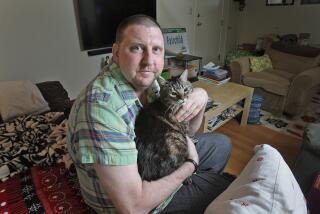Attorneys Argue That Bouvia Has Right to Reject Feedings
- Share via
Elizabeth Bouvia, the quadriplegic whose bid to starve to death in 1983 made her a symbol of the right-to-die movement, has a constitutional right to reject feedings forced on her at a county hospital, her attorneys argued Monday.
Richard Scott, attorney for the 28-year-old cerebral palsy victim, pleaded with a three-justice panel of the 2nd District Court of Appeals to overturn a lower court order and have Bouvia’s nasogastric feeding tube withdrawn.
But he insisted that, unlike three years ago, Bouvia is not trying to die.
“We are in no sense asking anyone to participate in or observe her suicide,” Scott said. “All she wants is to have that tube removed and have the same right to refuse medical care anyone else has.”
Taken Under Advisement
The panel took the case under advisement after hearing more than an hour of arguments from Scott and Steven Carnevale, lawyer for the county-run High Desert Hospital in Lancaster, where Bouvia is a patient. The appellate court gave no indication of when it would issue a ruling.
Many questions from the three justices elevated the courtroom dispute into a broad debate on medical ethics, focusing on a patient’s right to determine not just the quality of life, but the method and circumstances of death.
Scott cited California court decisions upholding a patient’s right to refuse medical treatment, such as ventilators and kidney dialysis, even if it means the patient may die. But Carnevale countered that such rulings were intended for the terminally ill and that Bouvia is not dying.
Many of the justices’ questions centered on whether the giving of food to Bouvia is considered medical treatment.
“If this is medical treatment, doesn’t she have the right to refuse it as medical attention?” asked Justice Edwin Beach. “And if it’s not medical attention, then how can the medical profession insist on giving it to this woman?”
Philosopher Seneca Quoted
Quoting the Greek philosopher Seneca, Justice Donald Gates observed that unlike the able-bodied, Bouvia’s handicap limits her options to determine how she might die.
“Seneca said, ‘There is one portal in life but a thousand exits.’ Not so for Elizabeth Bouvia,” Gates said.
Bouvia’s paralysis requires 24-hour medical care, which she cannot afford outside of a county hospital, Scott said.
Echoing the words of the judge who on Feb. 21 denied Bouvia’s bid to have the feeding tube removed, Carnevale argued that Bouvia is covering up her intention to starve by promising to sustain herself on a liquid diet.
Alarm Over Weight Drop
He said doctors who inserted the tube Jan. 16 were alarmed that Bouvia’s weight had dropped from 75 pounds last August to 67 pounds. Carnevale said removal of the tube would probably cause her death.
The Feb. 21 decision by Superior Court Judge Warren Deering was the second key defeat for Bouvia in her fight to refuse medical care in county-run hospitals.
She became a symbol of the right-to-die movement in the United States in December, 1983, when she requested court permission to starve in Riverside General Hospital. But a judge rejected her bid, declaring that society’s right to preserve life overrode her right to control her destiny.
More to Read
Sign up for Essential California
The most important California stories and recommendations in your inbox every morning.
You may occasionally receive promotional content from the Los Angeles Times.










